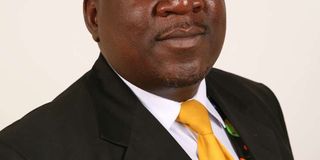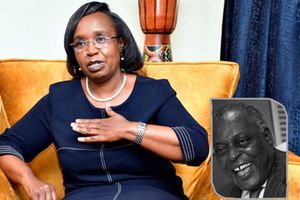Premium
From the archives: One-on-one with Papa Shirandula

Charles Bukeko aka Papa Shirandula. PHOTO | COURTESY | NATION MEDIA GROUP
What you need to know:
Artistes have a say and we have support from our big following and it is high time we came together and did something.
I would call all the stake holders and see what we can do to create employment for artistes.
His story gives hope to thousands of aspiring actors around the country. Having climbed from unfathomable levels of poverty, he has become one of the most sought-after entertainers across the globe. Charles Bukeko, popularly known as Papa Shirandula, is still going strong nearly two decades down the line. He spoke to ActScene about why only death will take him away from doing what he loves.
You are a father of three, why are your children not keen on following in your footsteps?
I don’t think they notice what I do. Children are very difficult and hard to predict. They have their lives, which do not go with my line of work. My daughter loves music and is strict about it. But the rest of the family supports me and my parents knew about the character Papa Shirandula before I even started acting it.
Why blame your wife on your weight?
I don’t know whether it is malice or maybe my wife is trying to keep me out of the “market”, but this is her doing. However, I’m fit; we have a small gym in the house.
What was your biggest break?
I would say that when I was cast as Herold for the play, Nativity, at Braeburn Theatre. I think that is when people saw that I had what it took to be an actor. James Falkland, the brains behind Phoenix Theatre, called me and told me there was more to do than acting. He decided to train me for free on theatre basics like lighting, directing, and put me on the theatre’s payroll. I would say he liked me for my consistency. From then on I was involved in every show he did in one way or another.
How did Papa Shirandula come to be?
I approached Wachira Waruru with the idea of a Papa Shirandula TV show and that is how I got into television. Thumbs up to him because I would not be where I am if it wasn’t for him, television-wise.
You grew up in theatre, what is happening now in the industry?
It is very difficult to gauge where theatre is at the moment in Kenya. Is it doing well or bad, that is the question? It is high time we had a forum to talk about theatre in Kenya. As far as I’m concerned, it is a policy issue and I would like to tell my fellow actors that it is time we seriously engaged the government because it has everything we need. We need to tone down the rhetoric about the government because it has so much to offer. It is so tiring living like orphans. There is so much kelele going on but we need to sit down and talk. We need sanity in this industry. You cannot just call yourself an artiste when you cannot account for what you did in the past year. Walking into a theatre does not make you an artiste.
Chris Foot vs Ezekiel Mutua, what is your take?
Artistes are very powerful. Take for example, Hollywood, they can control the country and I don’t know why we are not. There was so much going on after the general elections yet we did nothing. Artistes have a say and we have support from our big following and it is high time we came together and did something. In the US, entertainers run the economy and it hurts me when I see the people who could be running the industry not coming together. Foot will ‘OK’ a movie while Mutua will say ‘no.’ We need to bring sanity to our industry.
What would you change if you had the opportunity?
I would call all the stake holders and see what we can do to create employment for artistes. We need to put up better structures. As artistes, we also need to tone things down. The industry has been polarised.
What are you doing to see that theatre never dies in Kenya?
It all comes down to patience, consistency and being persistent. They should always remember that life isn’t about how much money you have but the difference you make in someone’s life. I feel great when we nurture talent, and our production (Papa Shirandula) employs more than 1,500 people.





